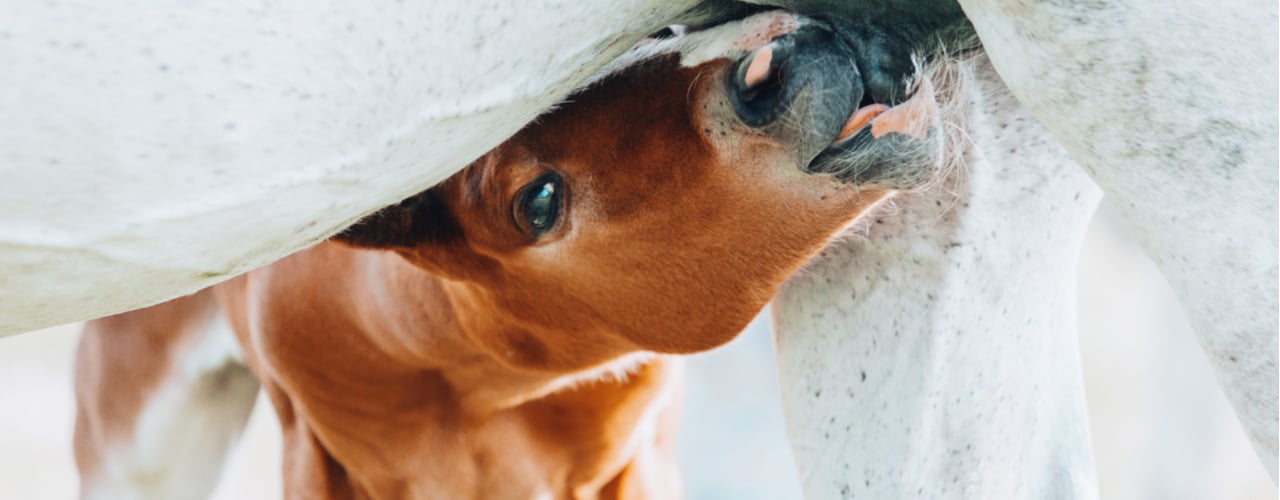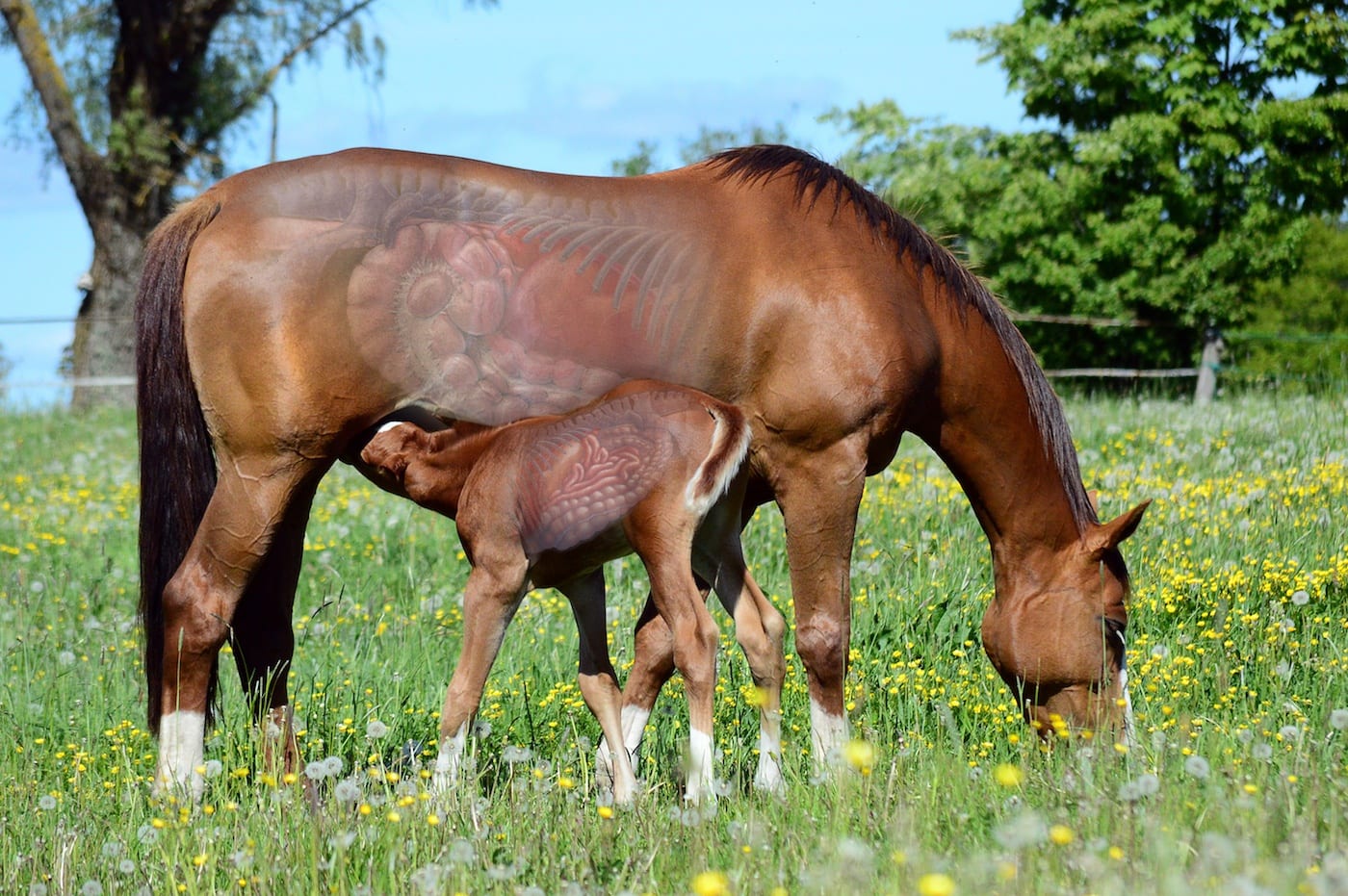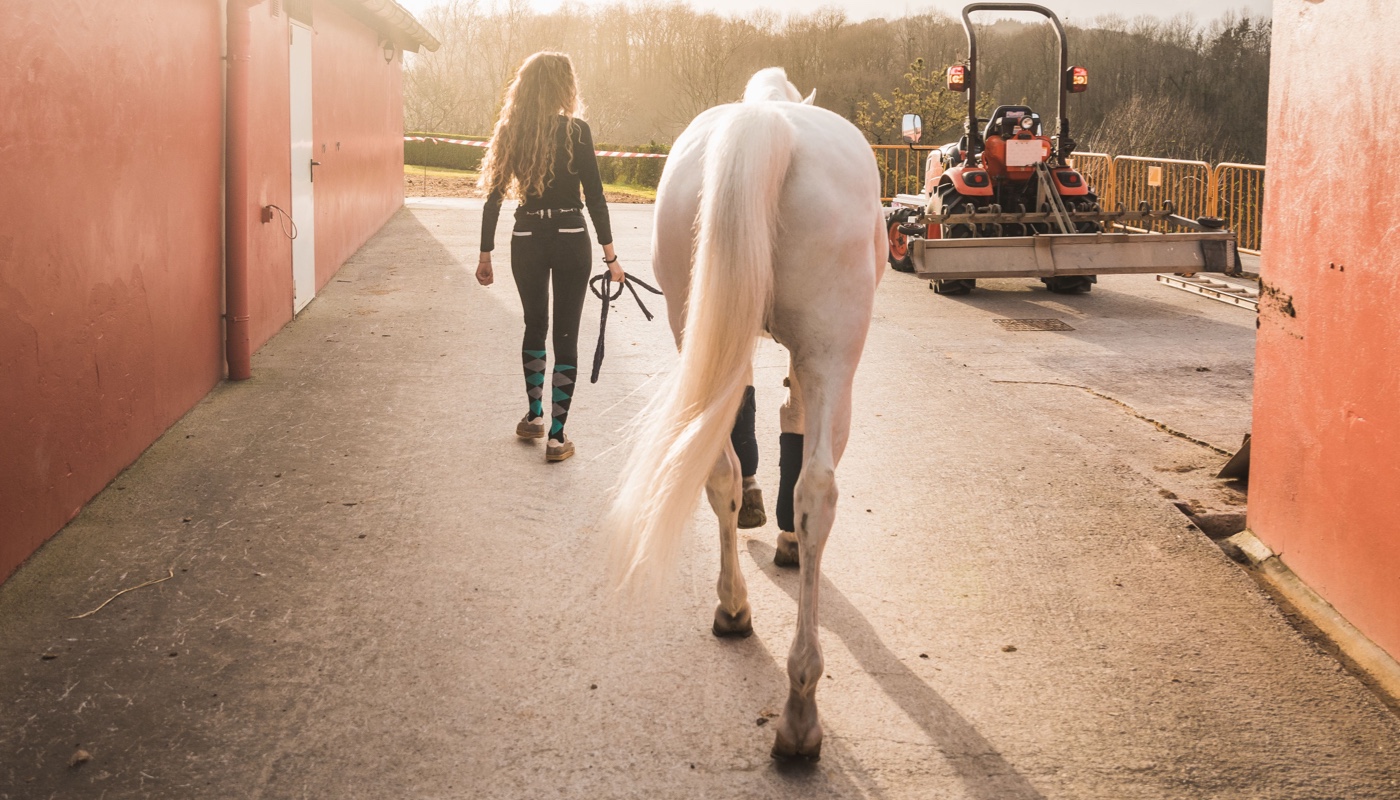From the very moment a foal drops, healthy digestion becomes central to many aspects of that horse’s well-being—and it’s at that moment the newborn’s GI tract begins to face ongoing challenges. Even as it works to absorb the protective colostrum the foal needs in those first few hours of life, the foal’s GI tract immediately begins undergoing a series of microbial, functional, and physical changes. Managing this development well sets a foal up for good health throughout those critical first few months of life . . . and far beyond.
Whether you are a professional breeder raising foals for sale or an owner breeding a favored mare, attention to GI health must be a core element of your management program. Here’s what you need to know about the GI health and development of foals—and how feeding SUCCEED in your breeding program supports the foal’s GI health, immunity, and overall wellness.
How the Foal’s GI Tract Develops
The length of the neonatal digestive tract is approximately one-quarter that of the full-grown adult horse. Different parts of the system grow and develop at different rates.
Initially, the small intestine is the primary site of nutrient absorption and uptake as the foal relies on the mare’s milk for nutrition. During this time, GI form and structure change, and the surface area of the gut wall grows, as protective mechanisms develop, and cellular differentiation occurs.
At birth, the foal’s digestive tract is effectively free of bacteria and microbes. The microflora then develops through environmental exposure to bacteria from sources like the mare’s udder, bedding, or pasture, or even through ingesting the mare’s droppings.
By two months of age, the foal’s hindgut development (cecum and colon) begins in order to prepare for hindgut fermentation and absorption of fibrous feeds. The foal starts to transition to a non-milk diet, completing the switch to a solid diet at around six months old. As it matures, the profile of the microbial population changes to enable the fermentation of complex carbohydrates. Simultaneously, the stomach begins to empty faster while food travels more slowly through the hindgut.
Digestive Health Considerations Specific to Foals
With all of this development and change underway, it’s no wonder that managing GI health can be stressful to foal owners.
In addition to the direct effects on nutrition and digestive health, both the mare’s and foal’s GI tracts play critical roles in immunity. This includes both colostrum production in the mare and absorption in the foal as well as the overall relationship of immunity to digestion in the healthy horse.
Here are a few of the digestive health considerations, though, that are very specific to foals and their development:
- The passive transfer of immunoglobulins (predominantly IgG) from mare to foal in colostrum is perhaps the most obvious and well-known health consideration at the time of birth. This immunity passed from the mare is necessary to protect the foal from infection for the first 2-3 months of life while its own immune system becomes fully functional. GI health and nutrition of the mare play a significant factor in these all-important colostrum IgG levels.
- The epithelial layers of the foal’s stomach develop a protective mucus coating over the lower glandular region. Despite this natural protection, young foals are still highly prone to gastric issues (Sanchez et al. 1998) and have been reported to have higher gastric acidity than older foals (Baker & Gerring, 1993).
- Healthy stool can be challenging to achieve in foals, with some studies inferring that hindgut disturbances contribute to these issues (Murray 1999, Stoneham, 1996). Most stool issues in foals are self-limiting and caused by normal developmental changes in the intestinal microflora. However, they are also prone to picking up bad bacteria causing infections that affect stool quality.
- A foal’s growth and ability to thrive depend on receiving optimal nutrition from its diet and on maintaining the health of its digestive system.
Benefits of Feeding SUCCEED in Your Breeding Program
Many breeders use and recommend SUCCEED, a natural and nutritional approach to managing the horse’s digestive health including the stomach and the hindgut. They know that a healthy digestive system supports every aspect of a foal’s health. And that means better growth and development, better performance, better attitude…better everything.
SUCCEED Supports:
- IgG levels in colostrum. A mare with healthy digestion has a healthier immune system which produces higher levels of IgG in colostrum. A 2006 clinical trial showed that SUCCEED did in fact support IgG levels in mares’ colostrum if added to their dietary program for 90 days prior to foaling. Broodmares receiving SUCCEED reported a 97% higher IgG concentration in the colostrum. (Carter & Pellegrini, unpublished. Available for your veterinarian to review in the SUCCEED Veterinary Center.)
- Gastric health. SUCCEED supports mucus production as well as cell growth and repair.
- Hindgi tract health. SUCCEED supports nutrient absorption, the protective barrier of the intestinal tract, and a healthy and balanced microflora. It’s a prebiotic, which means it feeds the good bacteria in the hindgut responsible for healthy digestion.
- Optimal nutrient uptake. Supports absorption and regulates the release of sugars into the bloodstream.
- Immune health and brain function. Beta glucan is proven to benefit healthy immunity. And there are clear links between good digestive health in general and immunity.
You can read more about the ingredients in SUCCEED and how they work together to support equine digestive health here.
Frequently Asked Questions About Feeding SUCCEED to Foals
How long should my gestating mare be on SUCCEED prior to foaling to get the colostrum benefit?
We recommend putting broodmares on SUCCEED at least 90 days prior to foaling.
How long should my mare be on SUCCEED after foaling for the foal to benefit?
A mare should be kept on SUCCEED for at least 90 days after foaling to maintain health through that critical transition period for mare and foal. Keep in mind that equine digestive health is a constant challenge, and SUCCEED only works as long as you are feeding it. It is most effective when horses are kept on it long-term.
At what stage do we start our foal on SUCCEED? As soon as it foals? After it is weaned?
Foals may be given SUCCEED at any time, and we recommend feeding it from birth through at least weaning when it finishes transitioning to a solid diet. Again, digestive health remains a challenge throughout a horse’s life, so feeding SUCCEED long-term is ideal for optimal digestive health and performance at all stages of life.
How much SUCCEED do I feed a foal?
We recommend giving foals a half serving of SUCCEED per day. You may increase to a full serving when they reach 6 months of age. The amount of SUCCEED to feed is not related to the size or weight of the foal or horse, but rather to the difference in digestive processes.
Can I use SUCCEED to support healthy stools and growth in foals?
Yes! SUCCEED supports the healthy structure and function of the entire digestive tract as well as optimal nutrient absorption. Maintaining a healthy stomach and hindgut with SUCCEED will help to support your foal’s healthy development.
Will SUCCEED help to support the foal’s immunity?
Yes! In addition to supporting IgG levels in mares, the foal’s healthy digestive tract aids in the development and maintenance of its own immune system. Beta glucan, the active component of the oat flour in SUCCEED, is well known to contribute to immune health.
Ready to Try SUCCEED?
Breeders in the United States trying SUCCEED for the first time are invited to take the SUCCEED Challenge. Try SUCCEED for 60-days. If you don’t see the results you want, we’ll refund your money, no questions asked.
Outside the U.S. or already a SUCCEED user? Find out where you can buy SUCCEED in your country.
References
Baker, S.J., Gerring, E.L., 1993. Gastric pH monitoring in healthy, suckling pony foals. Am. J. Vet. Res. 54 (6), 959–964.
Carter, S., Pellegrini, F.L., 2006. Effect of Adding SUCCEED™ to the Diet of Pregnant Mares 90 Days Pre-Foaling (unpublished).
Murray, M.J., 1999. Gastroduodenal ulceration in foals. Equine Vet Educ. 11 (4), 199–207.
Norikatsu, Y., Shimazaki, T., Kushiro, A., Watanabe, K., Uchida, K., Yuyama, T., Morotomi, M., 2000. Colonization of the stratified squamous epithelium of the nonsecreting area of horse stomach by lactobacilli. Appl. Environ. Microb. 66 (11), 5030–5034.
Sanchez, L.C., Lester, G.D., Merritt, A.M., 1998. Effect of ranitidine on intragastric pH in clinically normal neonatal foals. J. Am. Vet. Med. Assoc. 212 (9), 1407–1412.
Stoneham, S.J., 1996. Practical aspects of diarrhoea in the foal with particular reference to rotavirus and gastroduodenal ulceration. Equine Vet Educ. 8 (2), 84–90.




